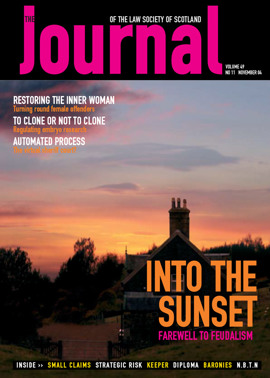Significant other
When new legislation is described as “potentially the most significant piece of employment legislation ever to be introduced in the UK”, employers and their representatives would be expected to sit up and take notice. However, when these are words spoken by former TUC General Secretary John Monks, it may be tempting to attribute them to trade union hyperbole. Not this time.
The legislation in question is the Information and Consultation Directive and its purpose is to ensure that employees in organisations over a certain size have the right to be informed and consulted about matters affecting their employment. The regulations to implement it are at an advanced stage of consultation and the final version should be available soon.
Breakfast in peace
Last year saw a number of instances of what has been dubbed “cornflake redundancy syndrome”, i.e. employees hearing of redundancies at their place of work on the breakfast news, or worse still, by text message as they sat eating their morning cereal. Probably the most high profile instance of the latter involved employees of The Accident Group. An employment tribunal found that senior management had known for four months that the company was unlikely to survive but had kept the troubles from staff until the last possible moment.
The regulations should reduce such occurrences as, in addition to existing obligations in respect of redundancies and transfers of undertakings, employers will have to inform and/or consult employee representatives at a much earlier stage about issues ranging from development of the employers’ activities and economic situation, to changes in work organisation or terms and conditions.
The regulations are not set to start their phased introduction until April 2005, initially affecting undertakings with 150-plus employees – and while clients may believe they will have time enough to tackle them in the new year, there are incentives to doing so as soon as possible.
By statute or negotiation?
After the regulations come into force, employers need only act if employees trigger a request for negotiations. Dealing with such a request will need to be done against the background of statutory minimum requirements which employers could find onerous. However, if an employer chooses to negotiate information and consultation arrangements before the regulations come into force, these can be tailored to suit the organisation’s circumstances.
Where an employer is subject to a statutory arrangement there will need to be one representative per 50 employees or part thereof. Thus if there are 151 employees, there will need to be four representatives. This is subject to there being a minimum of two and a maximum of 25, and elections will need to be held. However, if an employer negotiates an agreement there can be as many or as few representatives as the company and the employees choose, and the representatives can either be elected or appointed.
In terms of the matters on which the employer must inform and consult – under a statutory arrangement representatives must be informed about:
- the recent and probable development of the undertaking’s activities and economic situation;
- the situation, structure and probable development of employment within the undertaking and any anticipatory measures envisaged; in particular, where there is a threat to employment within the undertaking;
- decisions likely to lead to substantial changes in work organisation or contractual relations.
There must also be consultation about the latter two. However, if a negotiated agreement is reached, it is for the parties to decide what the subjects for information and consultation might be.
Getting your house in order
In order to show they have a valid pre-existing agreement in place, employers will need to meet four criteria: any agreement must be in writing, cover all employees, have been approved by the employees, and set out how employees or their representatives are to be informed and consulted. Negotiating such an agreement is likely to be an involved process, hence the advice to start as soon as possible.
It is important to make it clear to clients that the regulations do not impose negotiating machinery on employers. The responsibility for decision making will remain with management, but the views of employees should be actively sought and taken into account before a final decision is taken. If this does not reassure a client, mention of the potential £75,000 penalty for failure to comply with the legislation will perhaps cajole them into action.
And finally, for those of us in larger firms, we should be thinking about getting our own houses in order.
Jane Fraser, Head of Employment, Pensions and Benefits, Maclay Murray & Spens
In this issue
- Drafting consumer contracts
- Virtual firms: transactional learning on the web
- Ignorantia juris: it's all Greek to me
- Sheriff Court Rules Council consultation paper
- The Clinical Trials Directive - a summary
- Guarding the inner sanctum
- Neighbours in the global village
- Family law: is it the path for you?
- From sunset to sunrise
- What next for conveyancing?
- An ethical minefield
- Shredding the evidence
- Robbing the poor?
- Our dynamic profession
- A wider angle
- Keep the eye on the ball
- A rough guide to becoming a partner
- Rediscovering hope
- Sharpen your pencils
- Significant other
- Too far or not enough?
- Chipping away the infringers?
- View from Holyrood
- Website reviews
- Book reviews
- The Registers and the Appointed Day
- Feudal law: not just a relic
- Birth of a register






